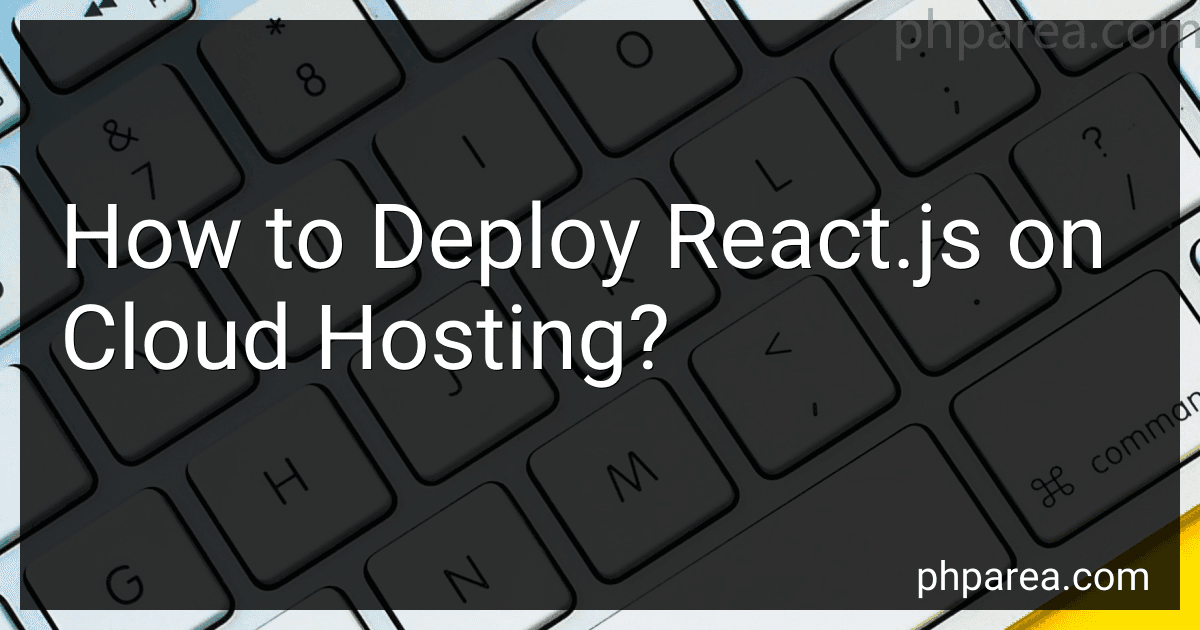Posts - Page 138 (page 138)
-
 8 min readTo conditionally render content in Svelte, you can use the {#if} block statement. Here's an example of how to do it: <script> let showContent = true; </script> {#if showContent} <div>This content will be shown if showContent is true.</div> {/if} In the above code, a boolean variable showContent is declared with an initial value of true. The {#if} block statement is used to conditionally render content based on the value of showContent.
8 min readTo conditionally render content in Svelte, you can use the {#if} block statement. Here's an example of how to do it: <script> let showContent = true; </script> {#if showContent} <div>This content will be shown if showContent is true.</div> {/if} In the above code, a boolean variable showContent is declared with an initial value of true. The {#if} block statement is used to conditionally render content based on the value of showContent.
-
 7 min readIn Laravel, you can check if the application is running in debug mode by accessing the configuration file of the application. The debug mode enables detailed error messages, stack traces, and other debug information to be displayed, which is helpful during the development and debugging phases.To check if the application is running in debug mode, you can follow these steps:Open the terminal or command prompt and navigate to the root directory of your Laravel application.
7 min readIn Laravel, you can check if the application is running in debug mode by accessing the configuration file of the application. The debug mode enables detailed error messages, stack traces, and other debug information to be displayed, which is helpful during the development and debugging phases.To check if the application is running in debug mode, you can follow these steps:Open the terminal or command prompt and navigate to the root directory of your Laravel application.
-
 8 min readPublishing Drupal on cloud hosting involves a few steps:Choose a cloud hosting provider: Select a cloud hosting service that best meets your requirements. Some popular options include Amazon Web Services (AWS), Google Cloud Platform (GCP), and Microsoft Azure. Set up an account: Sign up for an account with your chosen cloud hosting provider. This may involve providing some personal information and setting up payment details.
8 min readPublishing Drupal on cloud hosting involves a few steps:Choose a cloud hosting provider: Select a cloud hosting service that best meets your requirements. Some popular options include Amazon Web Services (AWS), Google Cloud Platform (GCP), and Microsoft Azure. Set up an account: Sign up for an account with your chosen cloud hosting provider. This may involve providing some personal information and setting up payment details.
-
 13 min readTo deploy a React.js application on cloud hosting, you can follow these steps:Create a React.js application: Start by developing your React.js application locally using tools like create-react-app or any other preferred method. Ensure that your application is fully functional and optimized for production. Choose a cloud hosting platform: There are various cloud hosting platforms available, such as Amazon Web Services (AWS), Microsoft Azure, Google Cloud Platform (GCP), and more.
13 min readTo deploy a React.js application on cloud hosting, you can follow these steps:Create a React.js application: Start by developing your React.js application locally using tools like create-react-app or any other preferred method. Ensure that your application is fully functional and optimized for production. Choose a cloud hosting platform: There are various cloud hosting platforms available, such as Amazon Web Services (AWS), Microsoft Azure, Google Cloud Platform (GCP), and more.
-
 7 min readCakePHP is a popular open-source PHP framework used for developing web applications. Deploying a CakePHP application on Google Cloud allows you to take advantage of the scalability and reliability offered by cloud infrastructure. This tutorial will guide you through the steps required to deploy a CakePHP application on Google Cloud.To start, you need to have a Google Cloud account and have the necessary credentials to access the Google Cloud Console.
7 min readCakePHP is a popular open-source PHP framework used for developing web applications. Deploying a CakePHP application on Google Cloud allows you to take advantage of the scalability and reliability offered by cloud infrastructure. This tutorial will guide you through the steps required to deploy a CakePHP application on Google Cloud.To start, you need to have a Google Cloud account and have the necessary credentials to access the Google Cloud Console.
-
 9 min readWhen working with forms in Svelte, handling user input involves a few key steps:Creating a form component: Begin by creating a Svelte component that represents your form. This component will consist of input fields and other necessary form elements. Binding input values: Use Svelte's binding syntax to bind input values to component properties. For example, you can bind the value of an element to a property called name in your component using bind:value={name}.
9 min readWhen working with forms in Svelte, handling user input involves a few key steps:Creating a form component: Begin by creating a Svelte component that represents your form. This component will consist of input fields and other necessary form elements. Binding input values: Use Svelte's binding syntax to bind input values to component properties. For example, you can bind the value of an element to a property called name in your component using bind:value={name}.
-
 4 min readIn Laravel, you can easily check if a collection is empty using the isEmpty() method. This handy method allows you to determine whether a collection has any elements or not, without needing to manually count the number of items.To check if a Laravel collection is empty, you can follow these simple steps:Obtain the collection you want to check. This could be retrieved from a database query, an API response, or any other data source. Apply the isEmpty() method to the collection.
4 min readIn Laravel, you can easily check if a collection is empty using the isEmpty() method. This handy method allows you to determine whether a collection has any elements or not, without needing to manually count the number of items.To check if a Laravel collection is empty, you can follow these simple steps:Obtain the collection you want to check. This could be retrieved from a database query, an API response, or any other data source. Apply the isEmpty() method to the collection.
-
 5 min readTo deploy Ghost on Google Cloud, you can follow these steps:Create a project: Go to the Google Cloud Console and create a new project for deploying Ghost. Set up a VM instance: In the Compute Engine section, create a new Virtual Machine (VM) instance. Choose the appropriate region, machine type, disk size, and other settings. Configure the firewall: Enable HTTP and HTTPS traffic in the firewall settings of the VM instance to allow users to access Ghost.
5 min readTo deploy Ghost on Google Cloud, you can follow these steps:Create a project: Go to the Google Cloud Console and create a new project for deploying Ghost. Set up a VM instance: In the Compute Engine section, create a new Virtual Machine (VM) instance. Choose the appropriate region, machine type, disk size, and other settings. Configure the firewall: Enable HTTP and HTTPS traffic in the firewall settings of the VM instance to allow users to access Ghost.
-
 6 min readIn Laravel, using timezones is straightforward and allows you to easily manipulate and display dates and times according to different regions. Here's how you can use timezones in Laravel:Configuring the Timezone: Laravel uses the configuration file config/app.php to set the default timezone for your application. You can modify the timezone option to the desired timezone, such as 'UTC' or 'America/New_York'.
6 min readIn Laravel, using timezones is straightforward and allows you to easily manipulate and display dates and times according to different regions. Here's how you can use timezones in Laravel:Configuring the Timezone: Laravel uses the configuration file config/app.php to set the default timezone for your application. You can modify the timezone option to the desired timezone, such as 'UTC' or 'America/New_York'.
-
 10 min readPublishing ElasticSearch on cloud hosting involves a series of steps. Here's a brief overview of the process:Choose a cloud hosting provider: Select a cloud hosting provider that supports ElasticSearch. Popular choices include Amazon Web Services (AWS), Microsoft Azure, and Google Cloud Platform (GCP). Set up an account: Sign up for an account with the chosen cloud hosting provider. Provide necessary information and payment details to create the account.
10 min readPublishing ElasticSearch on cloud hosting involves a series of steps. Here's a brief overview of the process:Choose a cloud hosting provider: Select a cloud hosting provider that supports ElasticSearch. Popular choices include Amazon Web Services (AWS), Microsoft Azure, and Google Cloud Platform (GCP). Set up an account: Sign up for an account with the chosen cloud hosting provider. Provide necessary information and payment details to create the account.
-
 4 min readTo create a basic Svelte component, you need to follow these steps:Set up a new Svelte project or navigate to an existing project directory.Identify the purpose of your component and decide on its structure, functionality, and styling.Create a new Svelte component file with the .svelte extension, e.g., MyComponent.svelte.Define the component's markup structure within the tags of the .svelte file. Use HTML-like syntax to define the structure.
4 min readTo create a basic Svelte component, you need to follow these steps:Set up a new Svelte project or navigate to an existing project directory.Identify the purpose of your component and decide on its structure, functionality, and styling.Create a new Svelte component file with the .svelte extension, e.g., MyComponent.svelte.Define the component's markup structure within the tags of the .svelte file. Use HTML-like syntax to define the structure.
-
 10 min readTo deploy Prometheus on Google Cloud, you would need to follow the following steps:Set up a Google Cloud project: Start by creating a new project on the Google Cloud platform or use an existing one. Ensure that you have appropriate permissions to create resources. Enable necessary APIs: Enable the Compute Engine and Google Kubernetes Engine APIs in your project. This can be done through the "APIs & Services" section in the Google Cloud Console.
10 min readTo deploy Prometheus on Google Cloud, you would need to follow the following steps:Set up a Google Cloud project: Start by creating a new project on the Google Cloud platform or use an existing one. Ensure that you have appropriate permissions to create resources. Enable necessary APIs: Enable the Compute Engine and Google Kubernetes Engine APIs in your project. This can be done through the "APIs & Services" section in the Google Cloud Console.